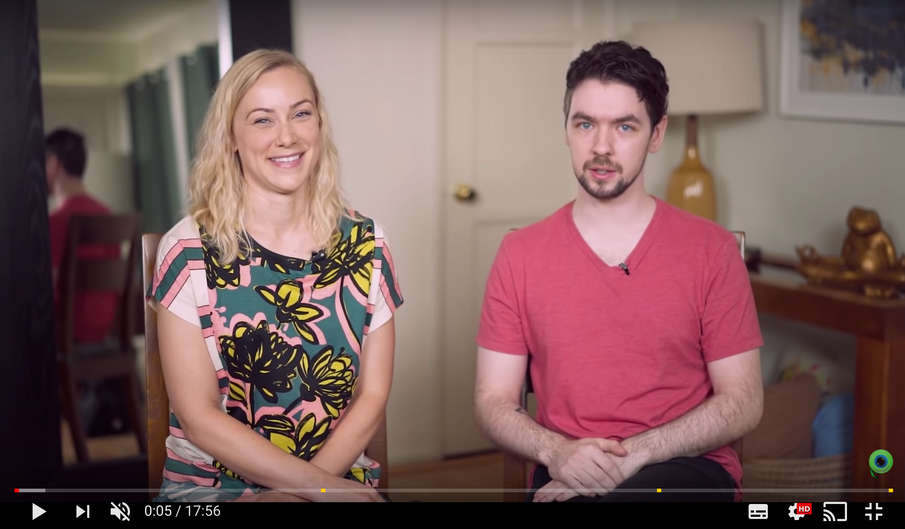Sean McLoughlin, better known as Jacksepticeye, has collaborated with licensed therapist Kati Morton to discuss the impact of creatives overworking themselves, burnout, and healthy self-care strategies he has incorporated to tackle his stress
YouTuber Sean has created two videos a day, every day, over the past five years, totaling over 3,900 videos with a combined 9.9 billion views. Earlier this summer, he announced he would be taking a break from his channel to look after his own mental health and wellbeing. In a series of videos released 16 August, created with therapist and fellow YouTuber Kati Morton, Sean discusses his own burnout.
Best known for his gaming let’s play series, comedy sketches, and heartfelt vlogs to fans, Sean has openly talked about his mental health throughout his time on YouTube. Frequently giving advice based on his own experiences with stress, anxiety and depression, Sean’s latest collaboration sees a blend of advice based on experience and expert opinion.
“You don’t have to be broken to do therapy” Sean explains as he opens up about his recent decision to see a counsellor for the first time.
Focusing specifically on burnout YouTubers and creatives may experience, the video highlights the increasing number of creators who are beginning to speak up about their feelings of being overwhelmed.
Kati talks about burnout in relation to digital creators, focusing on how their constant presence online and varying reward (monetary and views), despite a consistent effort, can have a major impact.
“It’s like a really fast treadmill that just keeps going. My upload schedule was the only thing keeping me on it.” Sean explains his own experience with burnout, and the positive affect taking his first break from YouTube in five years has had.
“Then I took a week off, I took a break, and it’s like everything slows down... it game me that change... I feel like I’m going at my own pace again now.
“Anybody watching, it’s OK to take a break.”
While traditional jobs offer regular paid time off, many freelancers and digital creators express feeling that they cannot afford to take a break and step back from work. Sean’s video highlights not only the importance of taking a break, but the physical and psychological benefits he has personally experienced following his own decision to take time to seek professional help and begin practising self-care. Sean explains:
“A year and a half ago, I was very much that meditation was for hippies and for a movie scene, more than it was to help. But the more I’ve gone on tour with all these people who are on the road all the time, in work mode... they deal with it, they come about it very positively. They all do yoga, meditation, transcendental meditation different things like that, taking 20 minutes for themselves, focusing on their breath, allowing their brains to shut off.
“It’s hard to do. You have to train yourself to do it I think, your mind wonders very often. But it’s good to allow it to wonder but be aware that it wonders, and bring yourself back to the centre. It’s worked for me at least. The more you do it, if you do it at the start or the middle of the day, it helps you get through the rest of the day a lot less anxious.”
Common signs of burnout can include:
- Avoiding work or things that used to excite you
- Becoming unusually irritable, snappy, tired, tearful or easily agitated
- An overall feeling unlike yourself
What can I do if I am experiencing burnout?
Kati shares her advice for how people can recognise signs and symptoms of burnout, and how they can combat them. While there is no magic fix-all, there are plenty of things people can do, including:
- Seeking therapy. Talking to a therapist can offer a judgement-free, safe space to open up and discuss anything that may be worrying or affecting you.
- If freelance work is causing you stress or anxiety, diversifying your income can help take the pressure off and give you the space to take a step back to look after you.
- Relying on others. You don’t have to do everything yourself. Know your limits. Listen to your feelings.
- Incorporate something that makes you feel good into your routine. It can be anything; talking with friends, going for walks, sitting in silence — take time to do anything that makes you feel better.
- Focus on you. Don’t get caught up in comparisons with other people. Use yourself as a benchmark for how you are changing and growing. Focus on how you have grown as a person.
Sean’s latest video comes just 24 hours after celebrating hitting 20 million subscribers. Dedicating 2018 to “PMA” (Positive Mental Attitude), Sean has held monthly livestreams to raise money for a number of charities. In just five hours earlier this year, fans helped raise $100,000 for the Depression and Bipolar Alliance.
Sean’s next livestream is scheduled for Sunday 19 August and will raise money to support the St. Jude Children’s Research Hospital.
For mental health advice and to find a therapist, visit Counselling Directory.


Comments